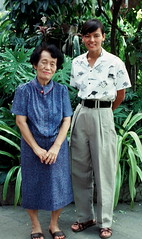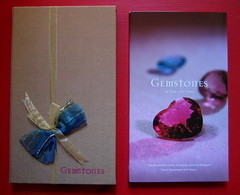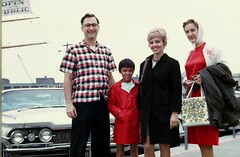About a Book
It's time to tell the story of the upcoming publication of my book (sometime in this new year), so that I may rise to the occasion. This was the book that was supposed to make me somebody. It was my American Dream book. The one that would catapult me from obscurity to fame like Amy Tan, who's first published story was discovered by an agent. Said agent then called her up and urged her to create four more characters in the same vein. The resulting book was The Joy Luck Club.
When I decided to write Diamonds In My Pocket nearly twenty years ago, I did not have such lofty visions. I simply wanted to lay down the stories of my childhood for those who might be interested in visiting Thailand. It took me nearly ten years to write the book and when I was ready to send it out to agents, I hit the Joy Luck Club window just right, and several wanted to see it immediately, but in the end the agents were of the opinion that the writing wasn't as strong as the material. I knew it to be true for my friends had already told me so. My readers could see the story in beautifully rendered description, but they could not feel it.
As far as my subconscious was concerned, the language of my Western education did not allow my emotions to connect to the page. English, with its multiple levels of psychoanalysis, intellectual theories and identity politics, was a language in which to hide in broad daylight. How much easier it was to find my feelings in the simple present tense, kitchen Thai of my childhood. What I needed was a hip-hop, broken English, raw emotion, queer manifesto right of passage, but there was none to be had.
Memoir wasn't even considered a legitimate art form in the literary world of fine fiction that informed my fellow writers. I had no feel for fiction and now agents were telling me I had no voice to tell my own story. The irony of this did not escape me. I had begun to see my life in headliness, much like the journalist in The Shipping News, a work of fine fiction popular at the time.
"Agents Go Wild for Query Letter", I scribed, followed by a report on my failure to sell my book. The vehicle for these "news" stories was The Wang King News, a one-page newsletter I created in the visual style of the Wall Street Journal. I sent it to my friends and family. Only a few understood the reference to the British term "wanking"—slang for masturbating.
The never quite objective, third person narrative of straight journalism amused me. The absence of emotion could render my life in quite horrific terms. "Gato Killed In Hit and Run", I wrote reporting the death of my cat. "Whitney Ex-lover Goes to Group Home" was the headline when my lover tossed me out of her life. And my favorite, "Woman Grows Bigger Brain", to describe my continuing education. If I couldn't manage a defining writer's voice, I had found a fitting irony in not having one. This detached perspective gave me the lens to see my life for the drama that it was.
When my grandmother, who was a major character of my book, died, her funeral brought together all the other characters of my extended family into a neat package and there I had my rewrite. Within the frame of the funeral I was able to sever every extraneous detail from the unwieldy 300-page manuscript I had first tried to sell. What emerged was a spare, wry narrative that kept the charm of the childhood stories and unloaded all the ex-lovers and a ponderous search for self. Now I had the book I thought was worth reading. I decided to go to the Maui Writer's Conference in Hawaii to try to interest an agent in person.
Through a connection with an organizer colleague who was an event manager at the conference, I managed to work passage as a volunteer. I sold tickets to aspiring authors with a book to sell. The $40 tickets were for a ten-minute interview with an agent, during which time you were to pitch your book. In the process of facilitating these transactions I was able to meet and briefly interview scores of writers.
Most of them had written memoirs and like dog show contestants who look like their pets, these writers looked like their books. "Overcoming disability with joy and clarity" one writer told me was the theme of her book and she smiled one of those "God is whispering in my ear" smiles as she hobbled away on her crutches. And then there was the man dressed, for the duration of the conference, in camouflage fatigues. "Your book wouldn't happen to have a military setting would it?" I asked him. "How did you guess?" he asked, then added, "I just tell them read my book or I'll kill you". He bought tickets for six agents. Later I picked up, off the floor, a sample page of somebody's book. It was just about the worse piece of writing I had laid eyes on. No wonder these agents were so aloof.
I bought my ticket too, and polished up my elevator speech. The marketing skills I had learned from my organizing colleagues went a long way to sprucing up my presentation. When it came my turn to meet my agent, I strode across the room with such confidence emanating from my person that this most hard-boiled of New York agents stood up to greet me when I was still ten paces away.
When she found out that all I had was yet another memoir she seemed disappointed and asked what I did for a living. When I told her, she was hopeful that I might have written an organizing book. That was what the market wanted - more how-to books for the voracious American appetite for self-improvement. I was just like the other 800 hopefuls at the conference clutching their life stories. I too, looked like my book. In the end she invited me to send her my first 50 pages, because of the exotic locale, she said.
Her response was similar to the other agents I had approached from the conference. The book was well written, but she was not confident that there would be a market for the story. Now that the book had enough of a voice, the market had disappeared. Dang! If my book was going to find a home between covers, I would have to forget about the American market altogether, forget about friends and acquaintances seeing my book at their local bookstore, forget about meeting strangers who had read my book, forget about being interviewed by Oprah.
I knew where a ready-made market existed; it just seemed so small fry. But on my next trip home to Bangkok I asked around for the names of local English language publishers and got some hopeful leads. Once I got home, the pressure of working my more lucrative organizing business took priority and I never got around to contacting them. Then came the blogosphere and my writing could be launched directly to a Googling audience. Astonishingly, I soon met strangers who had read my work. The direct feedback I was getting in the form of comments left at the blog and e-mails from readers was so interactive, my writing grew into the passionate, polemical, queer eco-activist voice that I had been seeking. Who needed publishers?
One day I got an e-mail from my cousin's husband in Bangkok. Raja had retired from his job as a vice president for Anderson Consulting and was going to use his business acumen to start his own publishing company. Would I consider allowing him to publish my book? I'd forgotten I had even mentioned it to him though I remembered his idea about starting a publishing company. I didn't think he was serious.
"You better read it first," I wrote back and sent him the first 50 pages.
"It's a very intriguing story and I am still interested," he wrote back.
"You better read the rest of it then," I told him. His wife, you see, was a significant character in my book, a foil for my own character. She was everything that I was not, immersed as she was in the details of late model Mercedes and designer handbags. He would have to know this incestuous truth if he was going to publish it. He wrote back saying he was still interested and never mentioned my characterization of his wife.
He sent me an advance of $5,000 to bind our commitment. I did not dare spend it for fear he would change his mind. He got an editor to work with me, a young man in Malaysia who had grown up in Canada. Raja thought he would be able to relate to the material. Raja himself was a Sri Lankan, British educated and living as a foreigner in Thailand. He prefaced each of our conference calls with insights on American politics and how we might get rid of the Bush administration.
After we had worked through the first pass of corrections, Raja hired a design team and talked nostalgically of pen and ink illustrations. I went to the website of the design company and was floored by the extent of their corporate accounts. Raja didn't want just a common book designer; he wanted a product designer. The same design company that would soon create a beautiful slip covered gift book about Thai gemstones authored by his wife, my cousin the aspiring jewelry designer.
The first thing the art director, who was British, said to me was that he thought my book was very good and even if he didn't already know bi-racial people and their issues, he would still find it interesting. A stranger, a professional marketer of products, thought my book was worthwhile. This gave me pause.
Suddenly a whole world beyond the dictated tastes of the American public opened up to me. The design team is located in Singapore, a major city of a newly globalized Asia. Here was a highly mobile, multi-cultural, population of Europeans working overseas much like my mother had done. Their local Asian counterparts were often educated in the States much like my father had been educated in England. And like me, the new generation was swept up by the opportunities of the West while still emotionally tied to the simpler way of life that had been the East.
From all appearances, my Asian peers had forgotten what they had left behind and were now feeling the isolating affects of living in nuclear family formation complete with pedigreed dog, high above the ground in those "sky" condos. They had filled their lives with high tech gadgets and in their air conditioned cars driving from underground parking lot to multi-story parking garage, they need never set foot on their own soil. And while safely inside the air-conditioned shopping malls and office buildings, they need never breath the heavily polluted air. These city dwellers and the corporate ex-pats working with them were my audience. How I longed to tell them the West did not have all the answers. In its own offshore way, this whole book thing could be really big.
The book would be distributed in Bangkok, Malaysia and Singapore. Raja wanted me to do a book tour. Picturing a reading in my hometown where my relatives had maintained their lifelong goal to lead a respectable life, I began to feel like a freak. It was one thing to be a personality in the West where personalities are appreciated and expected. Thailand was where I went to disappear from myself. Now, I would have to perform myself in the role of eccentric American transplant. I was beginning to feel panicked by the thought of this exposure. Why was I doing this? Was this my calling? Did this audience need me? I had been touted, on the website of the Post Carbon Institute, as a featured writer of the Energy Bulletin. I was on a tear to save the planet, or at least make sense of it as it was going down. What did a tame childhood memoir have to do with anything? The destiny of the diamonds in my pocket, it seems, was calling me anyway.








2 Comments:
This is what caught my eye.
"They had filled their lives with high tech gadgets and in their air conditioned cars driving from underground parking lot to multi-story parking garage, they need never set foot on their own soil. And while safely inside the air-conditioned shopping malls and office buildings, they need never breath the heavily polluted air."
No doubt this applies to upwardly mobile Asians almost everywhere. Too bad they, especially Chinese, couldn't figure out some sort of third way. They've adopted the American model in spades at just the wrong time.
When I say this, I think of all those co2 spewing autos that China is so hellbound to promote. It would be interesting to see a third way in print somewhere, if only to show what is possible.
Sadly, however, those in the midst of their upward mobility are hardly interested in such a vision. Apparently, they are experiencing the future, and it's worth it, despite your apt description of the consequences. Pollution, I guess, is considered a small price to pay when you're riding the intoxicating ride of modernity.
But we in the so called west are considered selfish for even suggesting a softer path. Why look how happy we are. Should we suggest denying this promised state of affairs to the rest of the world?
Well, yeh. But one day, when it is too late, will those in the luxury high rises miss what used to be called the earth?
Yes, this adopting of the American model of a car driven, high consumption lifestyle by my home city, is why I am an evironmentalist today. Bangkok was once a much more localized economy with heavily taxed imports that only the very rich could afford.
Post a Comment
<< Home